IFATCA’s VISION & MISSION
IFATCA’s VISION
IFATCA is the global voice of Air Traffic Controllers. It furthers air traffic safety, influences the sustainable evolution of aviation, and embraces all members of its community. The apolitical federation provides guidance, representation, training, and other services to advance the status and professionalism of air traffic control. It collaborates with other international organizations to achieve mutual goals.
IFATCA’s MISSION
To enhance air traffic safety, to promote the air traffic control profession, and to shape the future of air traffic management.
IFATCA IS …
GLOBAL
IFATCA is an international Federation, with Member Associations in more than 130 countries from all corners of the globe.
PROFESSIONAL
IFATCA unites and defends the professional aspects of the air traffic controller profession.
NON-PROFIT
IFATCA is a registered not-for-profit organisation in Montréal, Canada.
NON-POLITICAL
IFATCA maintains political independence.
IFATCA OBJECTIVES ARE …
b. To promote safety, efficiency and regularity in International Air Navigation;
c. To assist and advise in the development of safe and orderly systems of Air Traffic Control;
d. To promote and uphold a high standard of knowledge and professional efficiency among Air Traffic Controllers;
e. To protect and safeguard the interests of the Air Traffic Control profession;
f. To make mutual benefit affiliations with other international professional organisations;
g. To strive for a world‐wide Federation of Air Traffic Controllers’ Associations.
— Constitution of IFATCA

IFATCA’S REGIONS
The Member Associations of the Federation are divided into four regions to improve coordination and communication. These regions are largely based on normal geographical distribution; Africa & the Middle East, Asia and the Pacific, the Americas, and Europe. Each region is represented on the Executive Board by an Executive Vice-President for that region, who is the primary point of contact for most issues. Every year each region will hold a Regional Meeting, usually held between September and November. This event enables the Member Associations to discuss relevant issues and is normally an opportunity for small training workshops.

AFRICA & MIDDLE EAST

AMERICAS

ASIA/PACIFIC




